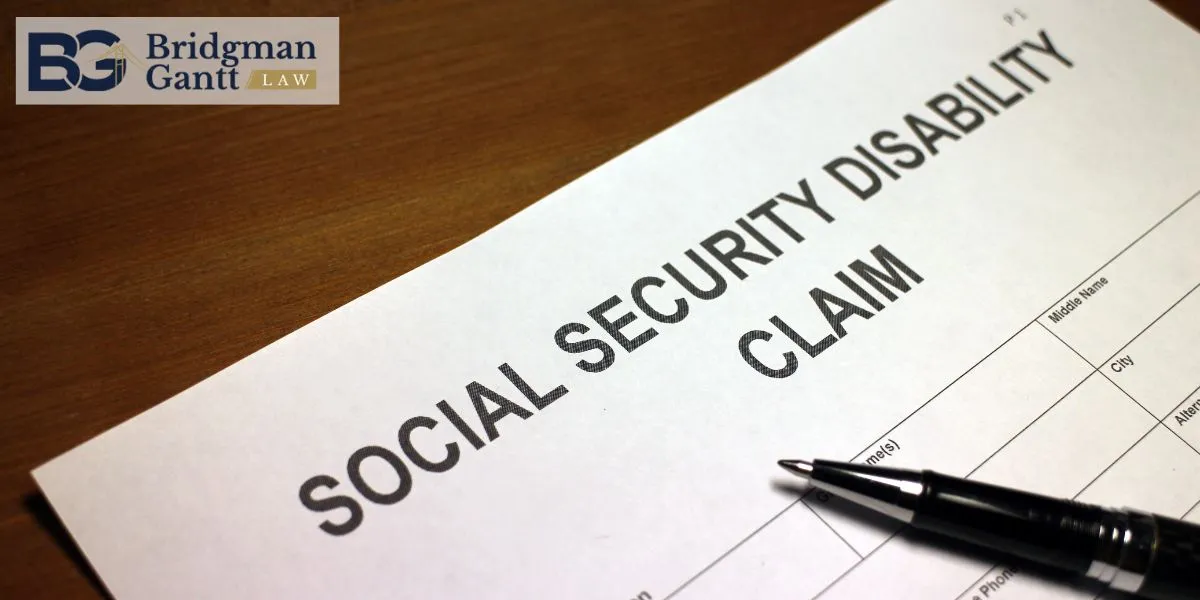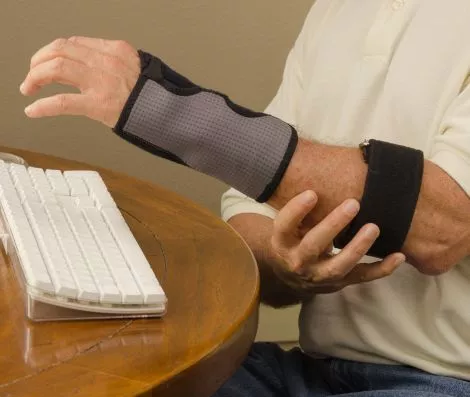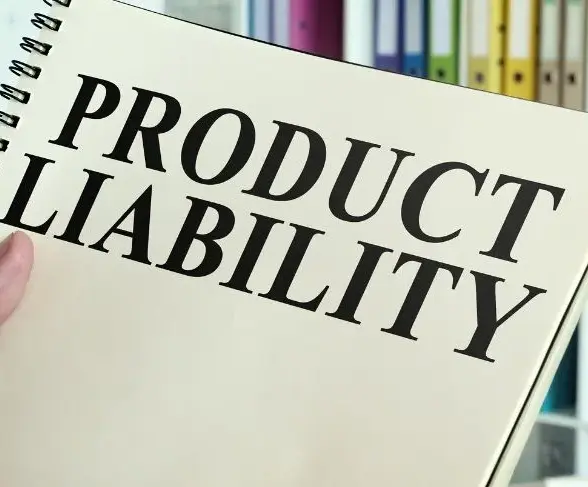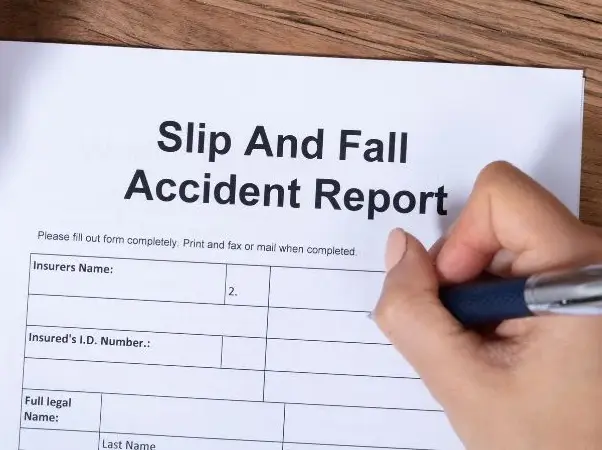Charlotte Office 704-815-6055
Asheville Office 828-252-2852
Charlotte Social Security Disability Lawyer
Charlotte Social Security Disability (SSD) Attorney
At Bridgman Gantt Law Offices, we are an established practice helping people in North Carolina and throughout the region obtain Social Security Disability (SSD) and other disability benefits.
We take a personal, hands-on approach to helping people struggling with physical and mental disabilities understand their options, navigate the application and appeals process, and ultimately obtain the benefits they need to cover expenses and maintain their independence and dignity. Our Charlotte Social Security Disability Lawyer is here to assist you.

The Information And Resources You Need To Get The Benefits You Deserve
If you are struggling with a disability, have worked five of the past 10 years, paid your taxes and meet the various other qualifications, you likely qualify for benefits. The problem is obtaining them. The paperwork, regulations, rules, deadlines and other factors associated with the Social Security Administration (SSA) are just too much to handle for most people.
Even if you do manage to file an application, chances are that it will be denied.
That’s where we come in. At Bridgman Gantt Law Offices, attorney Daniel Bridgman and his team can help you at all points in the process. Whether you’re exploring your options and need help filing an application or you have been denied once or even twice, we are here, ready to guide you.
Below are just some of the ways we can help clarify and address issues as you pursue SSD benefits:
- Analyzing your case and determining if you are entitled to benefits
- Explaining when and how to apply
- Offering tips on applying if you choose file on your own
- Explaining the common types of medical impairments that qualify for disability benefits
- Explaining factors related to applying if you are over 50
- Outlining the appeals process if your application is denied
Unlike large, national firms that juggle clients between various lawyers and support staff, we are a small, local practice committed to providing one-on-one services. When you work with us, you deal directly with Daniel and his team. Regardless of your SSD issue, we can provide you with the information, resources and representation you need.
Call Us For A Free Initial Consultation
If you have questions, let us provide the answers. Call us at 704-815-6055 or send an email to schedule a free consultation. Our primary office is in Charlotte and we routinely work with clients all across South Carolina with offices in Greensboro and Asheville. We also have an office in Columbia, South Carolina. Let us know how we can help.
Common Disabling Medical Impairments That May Qualify For Benefits
The Social Security Administration (SSA) reviews many disability application claims every day. Unfortunately, many people who genuinely need benefits are denied because their ailment or impairment is not properly documented. With the help of a North Carolina Social Security Disability (SSD) attorney, you can ensure that your application is completed properly the first time.
Below are some of the most common types of disabilities and impairments we see at Bridgman Law Offices:
Musculoskeletal Disorders
- These types of disorders can be inherited, congenital or acquired. They include problems affecting joints, muscles, ligaments and bones, including the spine. A great many musculoskeletal impairments are the result of traumatic damage from some sort of accident.
Cardiovascular Disorders
- Much of the SSA’s evaluation will focus on whether your disorder, such as heart failure or coronary artery disease, limits your ability to continue working and puts you at risk of suffering cardiac arrest or other heart-related issues.
Respiratory Disorders
- These disorders prevent proper lung functioning, resulting in shortness of breath and other health problems. For those struggling with chronic obstructive pulmonary diseases, the SSA will look to breath tests and other medical evidence when determining whether to approve benefits. For episodic disorders like asthma and bronchitis, the frequency of episodes that require medical attention will be important information to document in your application. Your attorney can explain all contributing factors and ensure that your application or appeal highlights key medical information.
Cancer
- A diagnosis of some forms of cancer will automatically qualify a person for disability benefits. For others, they may be deemed disabled if the cancer has progressed to a certain stage. Others may be found disabled if the combination of the cancer symptoms and the effect of treatments make it too difficult to work.
Neurological Disorders
- These disorders include a wide range of afflictions that affect the brain, central nervous system and peripheral nervous system. Common disorders include:
- Multiple sclerosis
- Parkinson’s disease
- Cerebral palsy
- Epilepsy
- Myasthenia gravis
Chronic Pain
- Chronic pain is a very real condition that afflicts many SSD claimants. It may stem from an illness or an injury or it may have an unknown cause. In many instances, chronic pain can limit a person’s ability to carry out basic, everyday functions such as walking, sitting, standing or bending. With the help of a lawyer, you can trace the extent of your condition and how it has impacted your life.
Contact An SSD Attorney About Your Condition And How To Apply For Benefits
If you or a loved one is struggling with an ailment or disability, get the information you need regarding SSD benefits by contacting us at Bridgman Law Offices at 704-815-6055. Our primary office is in Charlotte and we work with clients throughout the state as well as people in the Atlanta metro area and in Columbia, South Carolina.
Document Any Sitting, Standing And Posture Limitations
If you are struggling with physical disabilities, simple movements like walking, sitting, standing, lifting or crouching can be severely limited or even impossible. These restrictions can have a serious impact on your ability to do your job — whether you sit at a desk or are on your feet.
At Bridgman Law Offices, we help people in Charlotte, North Carolina and the surrounding communities understand their options for obtaining Social Security Disability (SSD) benefits to help cope with the financial and physical challenges of dealing with a disability and being unable to work.
Understanding Your Limitations Is Key When Applying For SSD Benefits
It’s important to thoroughly document your ailment when applying for SSD benefits. The medical evidence and personal testimony you provide are key factors the Social Security Administration (SSA) considers when reviewing an application.
Whether you’ve been dealing with pain for a long time or you’re just starting to notice the effects and their impact on your work, below are some questions you can ask yourself to determine whether your issue could qualify for SSD benefits:
- Is the pain keeping me from getting out of bed in the morning?
- Can I still perform my job duties or is my performance suffering?
- Am I unable to focus on my work or other daily tasks due to the pain?
- Has my mobility become limited in an unusually short period of time?
- Am I asking for help with basic tasks that I normally handle on my own?
As your representatives, attorney Daniel A. Bridgman and his team can help you gather your medical records, pursue treatment if you haven’t already and help you develop a strong case when applying for benefits or filing an appeal if you have been denied.
The Consultation Is Free, So What Do You Have To Lose?
If you’re struggling with bending, crouching, sitting, standing, walking or other basic physical movements, it’s time to call a lawyer who can help you determine whether you qualify for SSD or Supplemental Security Income (SSI) benefits.
To schedule your free consultation, call our Charlotte law office at 704-815-6055. You can also complete our online contact form. We respond to inquiries within one business day. We work with clients throughout North Carolina, Columbia, South Carolina, and across the Atlanta metro area.
Meeting The Threshold: Fully Insured And SSD
Most individuals who work for employers have a certain percentage of their earnings withheld for FICA taxes, which are used to pay the premium for Social Security Disability (SSD). To be eligible for SSD payments, a worker in North Carolina or elsewhere across the country must be fully insured.
Our attorney and team of professionals at Bridgman Law Offices can explain what permanently insured means and outline your options for obtaining benefits.
What Are Quarters Of Coverage?
The general rule for SSD eligibility is that the worker must have one quarter of coverage for every year after he or she turns 21 until the calendar year prior to the year in which a claim for disability is made.
The 40 Quarters Of Coverage Threshold
Once a total of 40 quarters has been earned, the individual is permanently insured and is eligible for SSD benefits even if he or she never works again. An experienced SSD lawyer can explain alternate eligibility requirements for younger workers who claim a disability before they have acquired 40 quarters of coverage.
Other Considerations
A sufficient number of quarters of coverage is a threshold requirement, but a worker must also fit the definition of disability to qualify for SSD benefits. Additionally, those with limited or no work history may be eligible under the Supplemental Security Income (SSI) program, which is a needs-based system also run by the Social Security Administration (SSA).
When You Need SSD Benefits, Contact Us For Personal Service
The SSD and SSI programs can be complex and confusing. Our team at Bridgman Law Offices can explain your options while guiding you through every step of the process. Call our Charlotte law office at 704-815-6055 or complete our online contact form to reach us via email.
How We Analyze Your Social Security Disability Case
At Bridgman Law Offices, we help people in Charlotte and across North Carolina understand how the Social Security Administration (SSA) defines disability and how it determines whether an individual qualifies for benefits. Through extensive experience and knowledge of the factors that the SSA employs to make such decisions, we can analyze your situation and put together the best case possible for a positive result.
Every SSD Case Is Unique
Although the SSA uses a consistent protocol to evaluate disability cases, no two claims are alike. Often, perhaps due to the large volume of cases that come through the system, only the most obviously disabled applicants are awarded benefits upon initial application. It is the job of your attorney to look objectively at your case to see where the strengths and weaknesses lie and clearly and convincingly present that information to the SSA.
There Are Many Factors To Consider
The initial interview between you and your Social Security Disability (SSD) lawyer will be the beginning point for analyzing your case. Topics that will be covered include:
- Your age, work history, education and job skills: There are two reasons for looking at your work history. First, we need to determine if you have sufficient work credits for eligibility for disability benefits. Second, the type of work you have done in the past is relevant in determining what work you may be able to do in the future.
- Your complete medical history: Supporting evidence, including test results, hospital admissions, medications and all treatment received, is essential information to building your claim.
- Information from you: How your impairments impact your daily life can be as persuasive in establishing your disability as any other information you can provide.
Contact A Local Social Security Disability (SSD) Attorney For Legal Advice
Listening to our clients and putting together cases with the best chance for success are what we do at Bridgman Law Offices. Whether you live in Charlotte, Greensboro, Asheville or elsewhere in North Carolina; Columbia, South Carolina; or the Atlanta metro area, we are just a phone call away.
Give us a call at 704-815-6055 or send an email to schedule a free consultation. SSD claims are handled on a contingency fee basis, meaning you don’t pay any legal fees unless we get you the benefits you deserve.
Over 50 Claims And The Unique Challenges Facing Older Applicants
At Bridgman Law Offices, we help people from all walks of life facing all types of disabilities obtain the Social Security Disability (SSD) and Supplemental Security Income (SSI) benefits they need to cover expenses and carry on with dignity.
Whether you work in manufacturing in Charlotte or in an office in Asheville, if your disability renders you unfit for work, our attorney and team of professionals can help you understand your options, obtain necessary treatments and pursue the benefits that can make life a lot easier.
The SSA Looks At Over 50 Claims A Bit Differently
As mentioned on our page discussing quarters of coverage and qualifying for benefits, the Social Security Administration (SSA) considers numerous factors when granting or denying benefits, including the age of the applicant.
The SSA will consider your work history as well as your disability and how it affects your ability to do your job. It will also consider whether your age will prohibit you from returning to your job or finding gainful employment going forward.
For people over 50, it’s often challenging to begin a new career or obtain the training they need to find a position commensurate with their previous job. For those who work in the trades, going back to school or undergoing training for a new position may not be practical. The SSA will consider these factors when reviewing your application for benefits.
As your representatives, we will sit down with you, review your work history and your medical records and determine if you have a good chance of receiving benefits. If you are over 50, our experienced Charlotte SSD attorney can explain how your age will factor into the SSA’s decision and can take steps to ensure your application or appeal clearly reflects the unique challenges you face as an applicant over 50.
Give Us A Call To Arrange For A Free Consultation
Learn more about applying for SSD benefits by calling 704-815-6055. You can also schedule a free consultation by completing our online contact form. From our Charlotte law office, we work with people across North Carolina, South Carolina and the Atlanta metro area.
We Can Explain The Residual Functional Capacity Form (RFC)
At Bridgman Law Offices, we deal with all aspects of the Social Security Disability (SSD) process, including the doctor’s residual functional capacity form (RFC), on a regular basis. Whether you live in North Carolina or elsewhere and are dealing with a disability, your RFC will play an important role in determining whether benefits are granted.
We encourage you to call us to discuss your disability and how we can help you get the benefits you need. Below is some general information about the RFC to get you started:
Purpose Of The RFC
The primary purpose of an RFC is to determine your residual functional capacity — simply put, your ability to perform certain work. An agent within the Disability Determination Services (DDS) department of the Social Security Administration (SSA) will first make a write-up of your case detailing the reason for his or her decision. Next, a medical or psychological professional working within the DDS will complete an RFC form that provides information about your residual functional capacity based upon the examiner’s write-up and the evidence contained in your medical file.
Physical RFC Form
A physical RFC form will contain information such as:
- How long you may sit, stand, crouch or kneel
- The amount of weight you can reasonably lift
- Whether you can grasp normally
- How far you can reach above your head
If your claim is denied, having an experienced SSD attorney review your RFC form is crucial. Inaccuracies can be uncovered and an expert medical opinion obtained if need be prior to your appeal. Your appeal will take place in front of an administrative law judge (ALJ) and is similar to a court hearing.
Mental RFC Form
A mental RFC form is completed by a psychiatric professional who will annotate symptoms such as poor memory and rate your ability to perform certain tasks. A mental RFC form will provide information on how well you adapt socially, learn new skills and perform simple routine repetitive tasks (SRRTs). In short, this form is used to assess your ability to perform substantial gainful activity (SGA). The problem with this is that an inability to perform substantial gainful activity due to a mental disability is difficult to articulate on a written form.
Mental Form Denials
It’s not uncommon for clients to contact an SSD attorney after receiving a mental RFC form that denies them benefits. The fact is that RFC forms completed by physicians employed by DDS recommend denials more often than they do approvals. Having your own physician fill out an RFC form on your behalf is more likely to have positive results, which is why we tend to recommend it for those claiming a mental disability.
Treating Physician Rule
Having your own doctor complete an RFC form is beneficial largely in part to the Social Security Administration’s “treating physician” rule. This rule states that a treating physician who has already established a relationship with the applicant has firsthand knowledge of that person’s condition and is therefore in a better position to provide evidence than a DDS doctor is. As such, DDS tends to give a great deal of consideration to the opinions of private physicians, which is why we encourage our clients to contact their own physicians early in the process.
Benefits Of A Private Physician RFC Form
Judges often rely on the opinions of claims examiners or DDS physicians who may make their decisions based on incomplete or shoddy evidence. With a clear, well-founded opinion from your physician regarding your functional capacity, the judge may be more inclined to rule in your favor.
When You Have SSD Questions, It’s Time To Speak With A Lawyer
Maneuvering through the disability process can be tedious, time-consuming and incredibly difficult without the help of an experienced SSD attorney. Instead of trying to handle your claim on your own, call us at 704-815-6055 and schedule a free consultation to discuss your case and your SSD questions. From our Charlotte law office, we help people in the Atlanta metro area as well as clients in Columbia, South Carolina.
Establishing The Credibility Of Your Statements About Pain And Other Symptoms
In evaluating your Social Security Disability (SSD) case, it is the duty of the disability law judge to determine if your medical condition meets the regulations under SSD laws. Many disability law judges in North Carolina and throughout the country base their decisions on information provided by your doctor and your medical records, in addition to your statements on pain and other symptoms.
From the time you fill out your application to your testimony in your disability hearing, it is important that your statements are consistent. At Bridgman Law Offices, we are a local team handling SSD claims in Charlotte and the surrounding communities, and we understand the disability laws that impact your case. We can help explain how your statements on pain and other symptoms affect your SSD case.
Remember, your medical records are objective assessments of your medical condition. These records reflect your medical tests, evaluations, medication and other issues your doctor has assessed regarding your condition. Furthermore, your medical records explain how your body reacts to certain medications and how side effects impact your ability to function. What these tests may not reflect is the pain you’re experiencing every day. As your attorneys, we can make sure your statements regarding day-to-day pain are documented.
The Importance Of Testimony And Medical Records
Your testimony and your medical records should support each other. As time goes by, your medical condition may change in several ways. Your condition may worsen or you may be diagnosed with other medical conditions. It is important that the information you provide is consistent with any changes in your condition.
For example, your medical records show that you suffer from carpal tunnel syndrome in both wrists, but when you go before the judge, you say that your condition is so severe that you can’t get out of bed or walk around the house. In this case, the medical records don’t quite match the condition you’re describing. Sure, your carpal tunnel may affect more than just your ability to use your hands, but you’ll want to make sure your statement is supported with medical evidence.
As the example shows, a judge weighs how credible you are as a witness. Your SSD attorney can prepare you for going before the judge. To be balanced, don’t use absolutes when discussing your pain levels. Absolutes include words like “never” or “always.” Statements like “I never get out of bed” can be harmful to your credibility.
Everyone’s tolerance levels for pain are different, but it’s important to honestly and accurately describe your pain levels. When you talk about your pain, think about how you would describe it to your doctor. You may want to include details about how sharp the pain is or where on your body you feel shooting pain. You should also discuss what activities increase or decrease the pain levels.
Your Disability Lawyer Can Help You Properly Discuss Your Ailments
You can discuss other symptoms you experience after you take your medication, such as feelings of dizziness or drowsiness. When you exaggerate your condition or pain levels, you jeopardize the credibility of your testimony. If your medical records and your testimony do not balance out, the judge may pay less attention to your testimony.
By working together, we can ensure that your statements are consistent with your medical records. To learn more, call our Charlotte law office at 704-815-6055 or complete our online contact form. We work with people throughout North Carolina as well as in Columbia, South Carolina, and Atlanta, Georgia.
When Do I Apply For SSD Benefits?
It may seem obvious to apply for Social Security Disability as soon as you become disabled, but the reality is that it is not always that easy or simple. At Bridgman Law Offices, we understand that there are reasons people do not apply for SSD benefits as soon as they should. As a local firm working with clients in Charlotte and throughout North Carolina, we are here to offer clear, easy-to-follow advice regarding when and how to apply for the benefits you need.
The following are a few of the most common reasons people fail to apply for SSD benefits:
Am I Actually Disabled?
First, you’ll need to determine how disability is defined under the Social Security Administration’s guidelines. To be eligible, your disability must be expected to last 12 months. However, that assessment is not always apparent. An attorney experienced in handling Social Security Disability claims in North Carolina and the surrounding region can explain how the guidelines pertain to your situation. It is best to file as soon as you become aware that your disability is long term or prevents you from any substantial gainful activity (SGA).
Continuing To Work
Many people believe that if they are working part time, they cannot apply; that is not true. If you are earning less than the SGA amount each month as outlined by the Social Security Administration (SSA), you are eligible to apply.
Collecting Other Benefits
Many people who should apply for disability struggle with their medical condition and employment far longer than they should. At Bridgman Law Offices, our SSD attorney regularly sees individuals who receive workers’ compensation or unemployment and wait until those benefits are exhausted before initiating a disability claim. By contacting us right away, you can avoid delays or gaps in your financial support.
Understanding The Timeline
Despite more optimistic projections, many disability cases take months and perhaps as long as a year for an initial decision, says attorney Daniel Bridgman. Most cases are denied and the appeal takes even longer. Too often, by the time an individual files a claim, he or she is in extreme financial distress with a long waiting period ahead. This means that the sooner you get started pursuing SSD benefits, the better your chances for getting your benefits as quickly as possible.
Mapping A Strategy
As difficult as it can be to acknowledge that you may have a permanent disability, it is best to file as early as possible. Not only will this help your claim to be resolved sooner, but it will also allow you to collect more back pay should your claim be approved.
Contact Us To Learn More
An experienced disability lawyer can objectively evaluate your case and offer counsel on the best approach. Call us for a free consultation at 704-815-6055 or complete our online contact form to send an email.
We are a local firm serving clients throughout North Carolina, South Carolina and the Atlanta, Georgia, metro area. If you have questions, contact us and learn how we can work with you.
How Will Working Part Time Affect My SSD Benefits?
A common question we hear at Bridgman Law Offices is, “Can I continue to work part time while receiving Social Security Disability (SSD) benefits?”
The simple answer to this question is yes, but with numerous exceptions. Although you can work, if you make more or work longer than the limits specified by the Social Security Administration (SSA), you may compromise your benefits.
When you reach out to us, we will help you understand the limitations on earning additional income while exploring options for ensuring that you have enough money to provide for your family.
What If I Need Extra Money To Cover Day-To-Day Expenses?
In short, substantial gainful activity, or SGA, refers to the wages or salary you earn from a job. The SSA sets specific limits on the amount a person can make without losing his or her SSD benefits ($1,130/month for non blind disabled applicants and $1,820/month for blind applicants).
Additionally, if you keep a job for more than six months, the SSA may consider you fit to work and cut off your benefits. However, if you work for a few weeks or months, but can’t continue due to your disability, the SSA may view this as an unsuccessful attempt at going back to work.
It’s important to document your work history — especially attempts at going back to work once your disability has been documented. These records may help support your claim for benefits or bolster an appeal.
Our lead attorney, Daniel A. Bridgman, can outline your options for pursuing a job while dealing with a disability. We will review your case and offer advice tailored to your situation. We will also explain the types of income that will not count toward the SSA’s SGA limits, such as:
- Child support
- Food assistance
- Income from an investment property
- Rent
- Interest
- Money earned from jobs working for family members or jobs specifically designed for disabled individuals
When you speak with us, we can determine the best course of action for you and your family. In some cases, this means continuing to work instead of pursuing SSD benefits. Regardless of the circumstances, we will offer advice only after we have a clear understanding of your case and your needs.
Contact Our Charlotte Social Security Disability Lawyer Today
Reach out and schedule your free consultation by calling 704-815-6055. Our primary office is in Charlotte and we work with clients throughout North Carolina as well as in Columbia, South Carolina, and Atlanta, Georgia.
Contact Us Today
Please fill out the form below and we will be in touch soon.
"*" indicates required fields




































